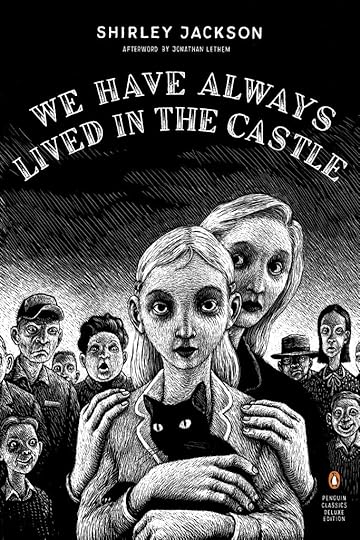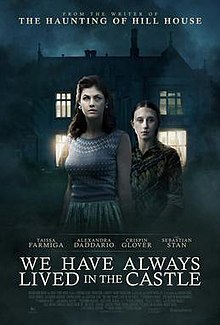Book Review: We Have Always Lived in the Castle

I thought the afterword to Shirley Jackson’s We Have Always Lived in the Castle by Jonathan Letham was rather clever. Among other things, he says, “Jackson is one of American fiction’s impossible presences, too material to be called a phantom …. too in-print to be ‘rediscovered,’ yet hidden in plain sight.” He goes on to tell about a parlor trick he used for a while, in which he would say his favorite author was Jackson, and when everyone said, “Never read her!” he’d say, cryptically, “Oh but yes you have.” Because nearly everyone (at least up until a point not that long ago) had read her short story, “The Lottery,” in school. And not only read it, but remembered it. It remains one of my favorite short stories and, indeed, I used to teach it in homeschool co-op. Both of my children have read it.
We Have Always Lived in the Castle is considered psychological horror. Taking place in the late 50s and published in 1962, it is the book after the short story, that (both) put Jackson on the map. In a small New England town, you have Merricat (Mary Katherine), an underdeveloped eighteen-year-old girl who is painfully shy and isolated and also creepy and more than a little off. But twice a week she must leave her secluded life in the town’s “castle” (read: old mansion with lots of land) with her older sister and ailing uncle to shop for supplies, facing a barrage of strange and cruel rejection and jeering from the young and old villagers. It is a mystery, this book, so I don’t want to go much further with the details, though I found the write-up on the cover to be too cryptic. I’ll give you this: there is murder most foul in the past. There is a gold-digging relative who shows up and brings things to a climax. There is an extremely quirky set of sisters.
Speaking of which, it took me a long time to get my bearings because for some reason Jackson does not give us some information I would have appreciated. For example, it takes place in Vermont. You’re welcome. Also, it is stated in the first sentence that Merricat is 18, but her voice and actions are so ridiculously younger that that piece of info flew right out my head within a page. But she is 18! And Constance is 28! You’ll just have to accept that they are stunted by their lack of interaction and some mental issues (including agoraphobia). Try very hard to see them the age they are, and not the ages they totally seem. I was fighting this battle valiantly the entire time. I wasn’t always winning.
Apparently, kids are still reading this book these days (like The Perks of Being a Wallflower). Maybe it helps that it’s shortish and that it is often marketed as horror. I mean, kinda. Perhaps psychological horror, but even then… There are themes that pop up in Jackson’s writing that were not only ahead of her time but also relevant today and likely for a long time to come. (I actually thought “The Lottery” was written in like colonial times or something.) The sheer lack of adults probably appeals to teens, as well. (The uncle hardly counts. You’ll see.)
I was kept guessing. Some things I got right and some things I got wrong, which is great fun for me when I don’t have it all figured out. I mean, eventually you are supposed to figure everything out. I was a little surprised that Jackson never takes us back into the past, really, to get to know the family members who are dead. And without a real peek into the sisters’ past, I did feel like something was lacking, like there was much unexplained. Like motive. Like the driving forces behind all the quirks.
One of the things this book does masterfully is build and keep tension. Even though—especially for a short book—it moves a little show, there is always this looming destruction, this dread of turning the page and yet desire to turn the page and find out more. Right from the first scene, with Merricat in town and all these people acting like complete, depraved fools around her, you begin to feel squirmy. Not just what comes next, or what is going on, but also this can’t be good. Speaking of which, this is not an uplifting book. If you normally read cozies, this is not your book. It is a little depressing, and like “The Lottery,” we find out, among other things, that society as a whole sucks. People as a whole suck. I didn’t ruin anything for you. It takes about three pages to understand that.
The writing itself is clear and clean. The “castle” becomes a character all its own, as well as the garden. There is an extremely strong sense of place. (Though I was often left wanting for a little more description to help me picture what was going on, largely with the main characters and the house itself. Like, there is so much vibes, but not so many details to build the setting in my imagination.) While it’s true that I enjoyed this book less than I thought I would—something about the voice, the tone, and the way the characters were aged—I did walk away thinking that it would be a great book to teach highschoolers. They would like it fine. And there is so much to discuss. Too bad I didn’t read this for a book club. (I read it to figure out comps (comparable titles) for the book I’m about to try and sell. But I’ve had my eye on it for years.)
YA. Mystery. Psychological horror. Classic. Letham also said, like her other works, themes include “…the wickedness in normality, cataloguing the ways conformity and repression tip into psychosis, persecution, and paranoia, into cruelty and its masochistic, injury-cherishing twin.” That about covers it. And a cat. And a spooky forest. And lots of cataloguing of poisons. And neighbors with pitchforks. You should read it. It’s intriguing, to say the least.

Shirley Jackson wrote six novels and tens of short stories, her most famous of which are the short stories “The Lottery” “Charles,” and “One Ordinary Day, with Peanuts” and her novels We Have Always Lived in the Castle and The Haunting of Hill House. “The Lottey” was published before she was thirty, in 1949, and she was suddenly successful and famous. She died within a few years of the publication of We Have Always Lived in the Castle which is partly autobiographical about her own struggles with neighbors and agoraphobia. If she hadn’t died so young, we would almost certainly have a much bigger body of work to be talking about.


I watched the 2018 movie. The best thing it did for me was to give me actors and a house so that I could finally see things in my head. It also gave me a clearer sense of time/history. Other than that, I liked the story in the book better than the story in the movie. It was pretty different, and ended up with some different themes and different vibes. And a different ending, almost entirely. I wouldn’t say don’t watch it. It’s a pretty good movie. But it’s not as good as the book.

“I sat very quietly, listening to what she had almost said. Time was running shorter, tightening around our house, crushing me” (p84).



